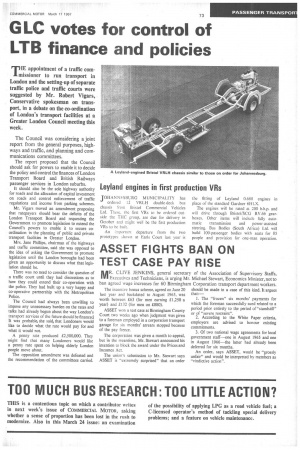G LC votes for control of LTB finance and policies
Page 75

If you've noticed an error in this article please click here to report it so we can fix it.
THE appointment of a traffic com missioner to run transport in London and the setting-up of separate traffic police and traffic courts were suggested by Mr. Robert Vigars, Conservative spokesman on transport, in a debate on the co-ordination of London's transport facilities at a Greater London Council meeting this week.
The Council was considering a joint report from the general purposes, highways and traffic, and planning and communications committees.
The report proposed that the Council should ask for powers to enable it to decide the policy and control the finances of London Transport Board and British Railways passenger services in London suburbs.
It should also be the sole highway authority for roads and the allocation of capital investment on roads and control enforcement of traffic regulations and income from parking schemes.
Mr. Vigars moved an amendment proposing that ratepayers should bear the deficits of the London Transport Board and requesting the Government to promote legislation to extend the Council's powers to enable it to secure coordination in the planning of public and private transport facilities in Greater London.
Mrs. Jane Phillips, chairman of the highways and traffic committee, said she was opposed to the idea of asking the Government to promote legislation until the London boroughs had been given an opportunity to discuss what that legislation should be.
There was no need to consider the question of a traffic court until they had discussions as to how they could extend their co-operation with the police. They had built up a very happy and co-operative partnership with the Metropolitan Police.
The Council had always been unwilling to impose any unnecessary burden on the rates and talks had already begun about the way London's transport services of the future should be financed It was probable, she said that Londoners would like to decide what the rate would pay for and what it would not.
A penny rate produced £2,500,000. They might find that many Londoners would like a penny rate spent on helping elderly London people move about.
The opposition amendment was defeated and the recommendation of the committees carried.








































































































































































































